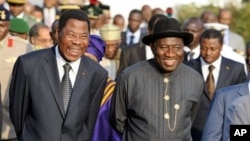A Nigerian analyst told VOA the West Africa sub-region and the people of Ivory Coast should not accept negotiations as a solution to the post-election crisis in Ivory Coast.
There are suggestions a few West African leaders may favor negotiations as a way to avoid a bloodbath and also give embattled President Laurent Gbagbo a face-saving exit.
Kabiru Mato, chair of the political science department at the University of Abuja, said the only solution to the problem in Ivory Coast is for President Gbagbo to heed the Abuja Declaration issued last Friday by West African leaders.
“The caution, or the warning, that the ECOWAS leaders gave last week in Abuja said that President Gbagbo is given some time to relinquish power; otherwise, he will be removed by what they referred to as ‘legitimate force’, (which), in my view, is what is required, especially West Africa at this particular time in order to resolve the seemingly endemic problem of protracted terrorists, who camouflaged as leaders taking advantage of the docility of the population to perpetuate their illegality,” he said.
One fear of those who are said to favor a negotiated settlement is that any violent removal of Mr. Gbagbo could spill over in the sub-region. They also maintain that violence and sanctions would only work to his advantage.
Mato said negotiating with Mr. Gbagbo would amount to a deliberate attempt to circumvent the will of Ivorians through a democratic process.
“Whatever the political configurations were, or are, are of secondary consideration as far as the sanctity of the voice of the people is concerned. Now, for anybody to call for negotiation or agreement, I think, is a deliberate attempt to short-circuit the essential tenet of what Western democracy is all about. So, negotiation with Gbagbo, in my view, is not essential; what is important is the position that both West Africa, Africa and the global community has given President Laurent Gbagbo to leave because that is the desire of the people of Ivory Coast,” Mato said.
Mr. Gbagbo, in his Sunday interview with Al Jazeera, reportedly suggested he would be willing to enter into power-sharing talks with Mr. Ouattara.
Mato said Mr. Gbagbo lost the election and there can be no power-sharing arrangement.
“As far as I’m concerned, the line has been drawn, the decision by the people of Ivory Coast has been taken, and that decision is simply that President Laurent Gbagbo has been voted out of office and replaced by Alassane Ouattara. Any attempt by people in Ivory Coast, or outside Ivory Coast, to change that remotely, or any way, in my view, reduces the essence of what we today stand by as the Western liberal democratic process which gives opportunity to the citizens to elect their leaders,” Mato said.












